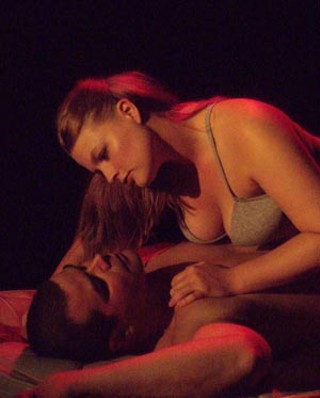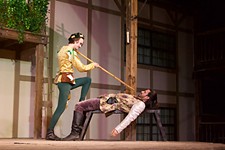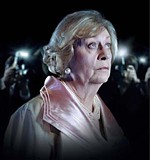Beirut
Vortex's revival confronts issues of the body – as object, as weapon, and as prison – head on
Reviewed by Avimaan Syam, Fri., Jan. 18, 2008

Beirut
The Vortex, through Jan. 26
Running time: 50 min.
What if? What if kissing your lover condemned him or her to death? What if just rubbing against them, let alone groping or making love, would lead to their abject pain, lesions leaking across their skin, life sucked from their body? In the hysterical times that Alan Bowne wrote Beirut, when the AIDS crisis was at its zenith, his play gave frightening answers to these terrifying questions: Contracting this disease can take away more than just your health and life. You can be stripped of your basic human rights, your place in society, and the freedom to do simple things like order a slice of pizza (or kiss or fuck your lover).
This is the world of Vortex Repertory Company's production of Beirut, set in a near-future, apocalyptic New York, where the big What If has occurred: What if a virus like AIDS has broken out in our society? Bowne's predictions are decidedly grim. Hollywood is closed, doctors are run out on rails, and the rich folk have gone gallivanting to the French Riviera in search of safety. Martial law has been instituted, citizens are required to be tested every few months, and those infected with the virus live in squalor.
The protagonist is an infected carrier, Torch, who survives on pitiful rations of electricity, water, and Vienna sausages. A white "P" is tattooed on his ass, so he can always be quarantined and identified as testing positive. The allusion to the Nazi regime and Stars of David is clear as those infected are treated like cattle, abused, forced into ghettos, and ultimately left to die. When Torch's uninfected girlfriend, Blue, sneaks into the quarantine zone for a visit, those "what if" questions become much more pointed: Blue would rather die with her lover than live without him.
Now, it is difficult to watch Beirut without thinking about the social context that it sprang from. The AIDS crisis, while still prominent in Africa and South Asia, is not something that Americans fret about every day or even every sexual encounter. But the play's conflict and meaning are still relevant today. Love, sex, and living form a strange triangle around the reasons for existence to Blue and Torch. Is sex really an expression of love? If you love something, should you set it free? Is life worth living without love?
Torch and Blue battle, bitch, and struggle with these questions and their own desires. The couple, played by married couple Matthew Patterson and Melissa Vogt-Patterson, aren't part of the intelligentsia but everyday New Yorkers, people who react with their organs more than their minds. Beirut confronts issues of the body in several ways, showing us the body as an object, as a weapon, and as a prison. Subsequently, we do see the body as these things: Both Torch and Blue are nude during the production and spend most of the show in no more than gray cotton underwear.
The nudity, along with the violence, is pointed and excessive without being gratuitous. Beirut wants to confront you with the dangerous potential in our bodies and our relationships, as well – Torch physically confronts and verbally threatens Blue on several occasions. Patterson and Vogt-Patterson interact so naturally together that nothing they do, from strangling to Brooklyn accents, seems out of place. If you need to be nude onstage with someone, your spouse seems like a pretty safe choice for comfort's sake.
Toward the climax of Beirut, Blue philosophizes that life and death "are joined at the hip." Just like a couple of lovers. Or just two people screwing. What if we had to choose between love and sex? A frightening proposition, but one that the Vortex's revival of Beirut tackles head on.










